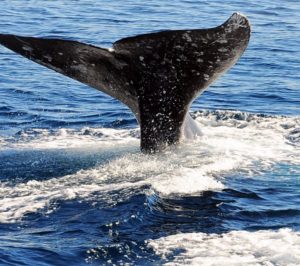 San Diego’s Year Round Whale Watching Schedule
San Diego’s Year Round Whale Watching Schedule
Experience the magic of migrating whales year-round! Whether you’re looking to get up close and personal or witness whales from the shore, there are tons of ways to enjoy these magnificent creatures off the coast of San Diego. Book your room and stay within 10 minutes of all major boat launches.
Winter & Spring Gray Whale Watching
Migration Period: Mid-December – April
Each year, more than 20,000 gray whales make a 10,000-mile round-trip journey from Alaska to the lagoons of Baja California, where the females give birth to their calves. After spending time in warm Baja California waters so their young can grow strong, they make the journey north again in spring. The longest known distance any mammal migrates on an annual basis, it is truly an extraordinary spectacle to observe. With 70 miles of coastline directly in the migration path, San Diego is an ideal destination to see this impressive parade of gentle giants. According to the Birch Aquarium in San Diego, gray whales generally travel alone or in pods of two or three but more may be seen traveling together during peak migration season. Gray whales can grow to nearly 50 feet in length, or roughly the width of a basketball court, and cruise at an average speed of 5 knots (or about 6 mph).
Summer & Fall Blue Whale Watching
Migration Period: Mid-June – September
Blue whales, the largest creatures on Earth and thought to be among the most endangered of the great whales, may be found off the coast of San Diego from mid-June through September. In fact, the largest group of blue whales in the world, some 2,000 to 3,000, feed off the California coast during the summer months. These magnificent mammals, which can be 100 feet long, give away their location by exhaling a 30-foot column of breath into the air whose vapor can be seen from miles away. The migratory patterns of blue whales have been tracked from the Antarctic to California to Costa Rica. Changes in ocean temperature and the abundance of krill, a prime food source, over the past few years have attracted far more blue whales to San Diego’s coast than in the past. Since blue whales tend to be found farther out to sea than their gray-whale cousins, it’s recommended to venture on a boat trip vs. viewing from the shore in order to catch a glimpse of these incredible leviathans.
> Find out more about Summer and Fall Blue Whale Watching
By Land or By Sea
There are a number of different ways to experience whale watching in San Diego. A couple of great spots to view the gray whale migration from shore include the Birch Aquarium at Scripps, Cabrillo National Monument and Torrey Pines State Reserve, where the hiking trails offer expansive views of the Pacific. If you’re interested in a closer look at these majestic creatures, a host of sightseeing and tour operators in San Diego offer a variety of whale watching excursions. This is also the best way to see a blue whale, as they tend to stay farther out to sea. A whale watching trip is also a fun oceanic adventure and affords great views of San Diego’s beautiful skyline from a different point of view. Many of the tour operators have extensive knowledge of the whales and their migration habits and will happily share this information during the tour. This is definitely a recommended activity for all ages and a great addition to your San Diego itinerary during the winter/early spring and summer seasons.


